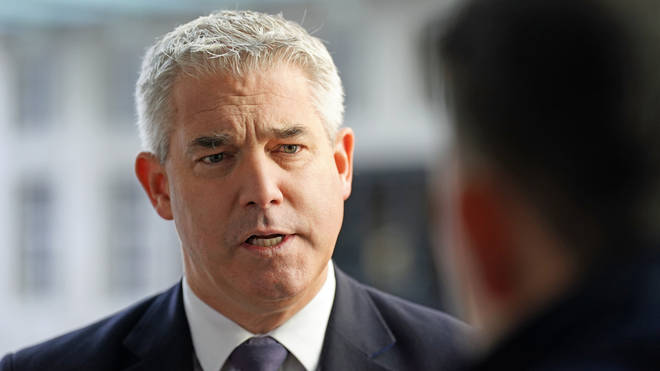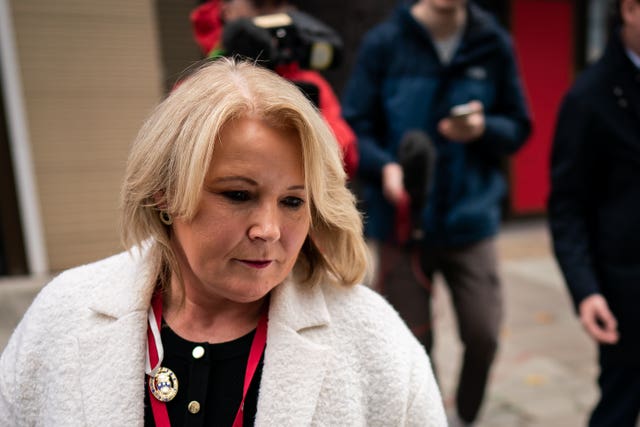UK Nurses tell Health Secretary it’s ‘pay negotiations or nothing’ to avert strikes
26 November 2022

Steve Barclay urged the RCN to ‘come back to the table’ for talks about working conditions.
The Royal College of Nursing has told the Health Secretary it is negotiations on pay “or nothing” after he urged the union to return for talks about working conditions to avert strikes.
Steve Barclay on Saturday continued his refusal to discuss pay as nurses prepare to strike on December 15 and 20 unless they get a 19% rise.
He wrote to the RCN urging its representatives to “come back to the table” for talks, with a Whitehall source suggesting these could include subjects such as pension arrangements, holidays, rosters and the availability of free coffee.
But the RCN’s general secretary Pat Cullen swiftly responded with a letter saying she would only be returning for pay talks after members voted heavily in favour of industrial action.
“I’m afraid the position of my members is ‘negotiations or nothing’,” she wrote.
“You cannot shut them out and then repeat that your door is open. If the negotiation table is empty, we can see you are not serious about progress.
“This dispute needs resolving and strike action is now little over a fortnight away.
“On behalf of every nurse, let’s negotiate.”

Since the result of the ballot was made public two weeks ago, the RCN said it has sought detailed and formal negotiations with the Government and has attended two meetings with the Health Secretary that it maintained did not focus on this year’s NHS pay dispute.
On the matter of strike exemptions and patient safety, the union will meet senior NHS officials in the coming days.
Mr Barclay wrote to Mrs Cullen to “express my deep regret that you have declined my offer of a meeting”.
“I want to reiterate what I have said previously: my door is open to discuss how to improve the working lives of nurses and other staff,” he added.
“I urge you to reconsider your position and come back to the table.
“I would once again like to make clear that I, my colleagues across Government, and indeed the public, value the care provided by nurses up and down this country and I am disappointed that you have taken this unprecedented step.”
The Health Secretary and Prime Minister Rishi Sunak have said the nursing union’s demand for a 19.2% pay rise costing an estimated £10 billion a year is unaffordable.
But an RCN spokesperson said: “This is gross scaremongering and many multiples of the accurate costs.”
The college says experienced nurses are worse off by 20% in real terms due to successive below-inflation awards since 2010, despite a pay rise of about £1,400 awarded in the summer.
ByKaren Graham
Published November 25, 2022

Nurses in UK protesting pay gap in 2020. Source - Garry Knight from London, England, CC SA 2.0.
The Royal College of Nursing (RCN) announced strikes on 15 and 20 December in its pay dispute with the government.
The national strikes – the first in the RNC’s 106-year history – are expected to last for 12 hours on both days. The Guardian is reporting that the strikes will be the first in a series of strikes over the winter and into the spring by NHS staff, including junior doctors and ambulance workers.
The RCN said it had been given no choice after ministers would not reopen talks, but the government said the 19 percent pay raise demanded was unaffordable.
Yet, nursing staff is either using food banks to help feed their children or actually leaving nursing to work in supermarkets where the work is less stressful and the pay is better, according to Reuters.
Chukwudubem Ifeajuna, a nurse in the south of England, said, “I have a few staff who are using food banks at the moment. I’ve had to cut down on a lot of things with the kids and I can’t afford to provide for them because of the high cost of living. So it’s really really tough, for everyone, not just myself.”
“We are striking because we deserve to be paid better. We haven’t had decent pay for over a decade now.”
Patricia Marquis, director of the Royal College of Nursing (RCN) union in England, said the government must listen. “This is not something that nurses do at the drop of a hat,” she told Reuters.

equals: $18,106.89
Even though the strikes will last 12 hours each time, under trade union laws, the RCN has to ensure that life-preserving care is provided during the strikes.
This means that some urgent cancer services, urgent tests and scans, and ongoing care for vulnerable patients will be protected alongside A&E and intensive care – although it will be up to local health bosses and union leaders to negotiate exact staffing levels on strike days.
However, the strikes that are expected to go on through the spring will certainly increase the backlog in non-urgent hospital treatment, according to The BBC. A record seven million people are already on the waiting list in England.
Louise Ansari, from the Healthwatch England patient watchdog, said she was “concerned” about the impact on this group of patients.
And added to the strikes being planned by nurses, The Guardian notes that postal workers, university staff, and Scottish schoolteachers went on strike on Thursday, while rail unions reaffirmed plans for eight days of national strikes despite a “positive” meeting with ministers.
No comments:
Post a Comment